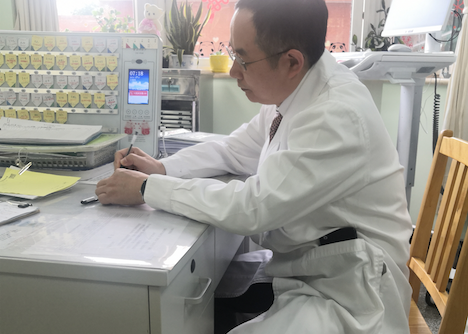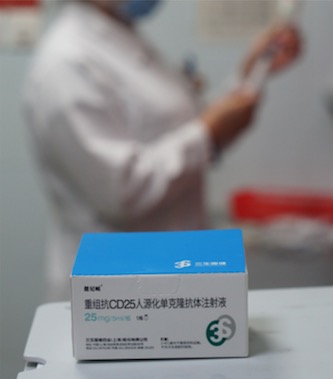(October 17, 2019, Shanghai) The first prescription of the humanized anti-CD25 monoclonal antibody drug developed independently in China was issued in Zhongshan Hospital Affiliated to Fudan University today. The monoclonal antibody drug is independently developed by Sunshine Guojian, and is used for prevention of acute rejection after renal transplantation. Professor Zhu Tongyu, Vice President of Zhongshan Hospital Affiliated to Fudan University, said: “The first prescription of Xenopax means that Chinese transplant recipients can have access to more treatment options, and it also marks that the pharmaceutical capability in the field of immunotherapy in China has reached the international first-class level. Sunshine Guojian is expected to develop more and better biological preparations and make contribution to the improvement of China’s medical capability.”

▲Professor Zhu Tongyu issues the first prescription.
The patient, Ms. Li, was in urgent need of renal transplantation due to physical illness and the transplanted kidney was finally available after long-time waiting. In order to reduce the acute rejection, President Zhu prescribed Xenopax for Ms. Li at 7:18am. Ms. Li said happily, “The day has finally come. Thanks to the careful care by President Zhu and the medical staff, I believe that I will recover soon and return to a normal life.”

▲The first prescription benefiting patients
Renal transplantation, as the optimal renal therapy alternative for patients with end-stage chronic renal failure, is being rapidly rolled out in the world. The statistics of Chinese Scientific Registry of Kidney Transplantation Data Center (CSRKT) showed that 7,131 cases of renal transplantation was completed in China in 2015, ranking second only to the United States.
However, the long-term survival rate of the graft after renal transplantation remains at a low level. The latest OPTN/SRTR annual report published in Am J Transplant in February 2019 showed that the 10-year all-cause graft failure rate was 49.7% after the deceased donor renal transplantation, indicating that the 10-year graft survival rate was only 50.3%.
The application of immunosuppressor plays a vital role in improving the long-term survival rate of grafts. Clinical applications showed that the acute rejection can be decreased by antibody induction therapy, leading to a reduction of 30%-40% of the incidence rate of early postoperative acute rejection. In recent years, it has become a new trend to select a reasonable immunosuppressor regime to reduce the incidence rate of adverse reactions and improve the long-term survival of renal transplant recipients, rendering the humanized antibody with less heterologous protein up to needs of the development of organ transplantation in China.

▲The nurse is injecting for the patient.
As a pioneer in the field of antibody drugs in China, Sunshine Guojian has successfully broken the technical barriers in the production of antibody drugs set up by Europe, the United States and other developed countries. It has been committed to the international priority disease field of antibody drugs, and has taken the initiative to develop multiple technical platforms for innovative antibody drugs. Xenopax, the only humanized anti-CD25 monoclonal antibody drug independently developed by Sunshine Guojian, obtained the drug GMP certificate issued by the National Medical Products Administration in June 2019 for prevention of acute rejection after renal transplantation and it can be combined with the routine immunosuppression regime to significantly improve the survival rate of transplanted organs and the quality of life of patients.
References:
Organ Transplantation Branch of Chinese Medical Association. Organ Transplantation. 2016; 7 (5):1-5.
Hart A, et al. Am J Transplant. 2019 Feb;19 Suppl 2:19-123.
About Xenopax
Xenopax loads the DNA fragments of light and heavy chain genes containing anti-CD25 humanized monoclonal antibody into the eukaryotic expression vector by DNA recombination technology, and transfects the Chinese hamster ovary (CHO) cells, allowing efficient expression of anti-CD25 rhMAb protein. Xenopax is suitable for prevention of acute rejection after renal transplantation and can be combined with the routine immunosuppression regime to significantly improve the survival rate of transplanted organs and the quality of life of patients. Xenopax is the first humanized monoclonal antibody approved for marketing in China.
About Sunshine Guojian
Founded in 2002, Sunshine Guojian is an innovative biopharmaceutical enterprises specializing in antibody drugs and is also a high-tech enterprise with independent capabilities in research and development, manufacturing and commercialization. The company prioritizes R&D in innovative therapeutic antibody drugs, and provides high-quality, safe and effective clinical solutions for the treatment of autoimmune diseases, tumors and other major diseases. At present, the company has 15 antibody drugs (including 7 drugs in clinical phase and post-market clinical follow-up, 8 drugs in pre-clinical phase) in different development phases, covering tumor, autoimmunity and ophthalmology and other disease areas, most of which are Class 1 biological products or monoclonal antibodies for therapeutic use.